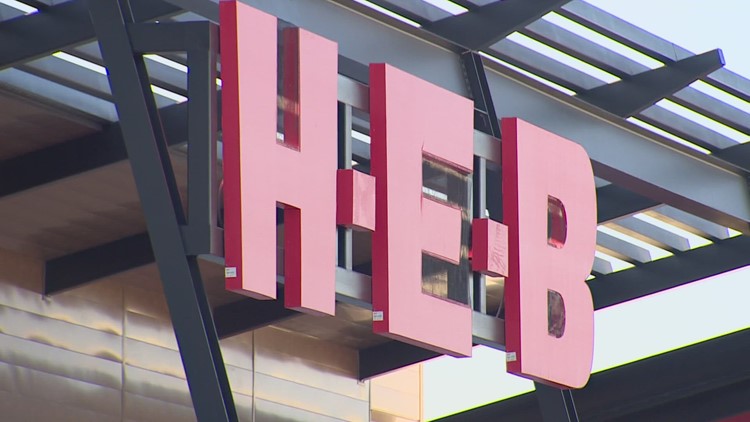DALLAS — Read this story and more North Texas business news from our partners at the Dallas Business Journal
H-E-B LP's push into Dallas-Fort Worth is making waves in the grocery world, forcing companies that have long dominated the market to take notice of the Texas chain with a fervent following.
Founded in 1905, San Antonio-based H-E-B operates more than 430 stores across Texas and Mexico. It's a huge force in places such as Central and South Texas, and is a retail bellwether that is a magnet for other stores.
But only recently has H-E-B emerged onto the North Texas grocery scene, with its debut store opening in September 2022 in Frisco — an event celebrated with a DJ, high school drum line and 1,500 people waiting in line at 6 a.m.
On Jan. 11, H-E-B broke ground on a new store in Melissa, about 40 miles north of Dallas, exemplifying how its North Texas expansion has largely taken place on the urban fringe.
"H-E-B's investment into Melissa benefits the entire community and creates a welcoming, active-use gateway into a rapidly growing city," Mabrie Jackson, the company’s senior director of public affairs for the region, said in an email.
H-E-B's impact in North Texas extends well beyond the shopping aisles and checkout lines. The grocery giant is also making waves as a driver of new construction and a major jobs creator.
H-E-B accounts for large chunk of North Texas retail construction
With new stores that opened in 2023 in McKinney and Allen, H-E-B accounted for a whopping 22% of all retail construction in DFW last year. That was according to a study by Dallas-based real estate firm Weitzman, which surveyed roughly 1,400 shopping centers in the region.
Retail construction across DFW totaled about 1 million square feet in 2023, low when compared with historic levels. But occupancy hit a record high of 95.2% last year, according to Weitzman, emphasizing how storefronts in desirable areas are still in high demand.
H-E-B, the largest privately owned company in Texas, now has five stores in the Metroplex, with four of those in Collin County. The company also has six locations of its upscale Central Market subsidiary.
"The tremendous growth across North Texas counties is no secret, and the number of requests we received from the residents to build here has been overwhelming," Jackson said.
It's no surprise that H-E-B chose the fast-growing areas north of Dallas for its initial rollout in North Texas, according to Bob Young, managing director at Weitzman. As the old adage goes, retail follows rooftops. Family-friendly suburbs like Celina, Prosper and Melissa are seeing tons of new housing construction. According to the latest U.S. Census Bureau data, Collin County’s population has nearly doubled since 2000, reaching more than 1.2 million — nearing the size of the City of Dallas.
"As these rooftops, both single and multifamily, occur, the daily needs that can be provided to the consumer, or the grocery store, is powerful," Young said. "It drives traffic."
An H-E-B store opening in an area is rarely an isolated event. Several developments, including retail, restaurants and other grocers, tend to emerge around H-E-B stores. But a difficult economy has put a damper on some of these plans for now, Young noted.
“There will be other developments that will happen because of them, but right now [H-E-B] is the player,” he said.
H-E-B spurs grocery competition in DFW
H-E-B is not the only grocery company looking to grow in North Texas, as the booming population drives the need for food options.
In its annual forecast, Weitzman predicted that 2024 will be the most active year for grocery construction in more than a decade, with at least 14 new stores expected under construction or opening.
Sprouts Farmers Market recently announced plans to open four new grocery stores in Dallas-Fort Worth. Kroger, which has been in North Texas for more than 65 years, said in a statement it is investing several million dollars into its existing DFW stores, including on technology upgrades, energy-efficient coolers and freezers, new flooring and on "thousands of new local, healthy and nutritious options."
"As growth continues to be a hot topic in North Texas, Kroger is expanding to meet demand and has broken ground on three new Marketplace format stores in the cities of Melissa, Plano and Fort Worth, all of which will be opening in 2024," said John Votava, director of corporate affairs.
Together, Central Market and H-E-B rank as the seventh-biggest grocery chain in DFW by market share at 3.62% in 2022, according to data from Chain Store Guide. That was the latest available data, but the company's combined store count has grown 36% since then.
Walmart was No. 1 at 27.68% in Chain Store Guide's 2022 data, followed by Kroger (16.43%), Target (7.46%), Sam’s Club (7.18%), Tom Thumb (7.1%) and Costco (6.08%).
H-E-B is known for high-quality private-label products and creative discounts, as well as for the wide variety of its offerings, from banking to beauty to pharmacies. Some stores have restaurants inside: the Melissa location will include a pharmacy and a True Texas BBQ, each with a drive-thru.
"H-E-B's following is almost a cult following," Young said. "People love, love, love that grocer, and so it will continue to dominate the marketplace."
Kroger has also begun to elevate its in-store offerings, he noted: “The more the experience becomes desired by the consumer, the greater the following.”
H-E-B is also testing its value-priced Joe V's Smart Shop chain in Dallas — construction started in 2023 on a pair of stores, on Wheatland Road and on Buckner Boulevard.
H-E-B creating thousands of jobs as it continues to grow in Dallas area
In addition to providing more grocery and food options to consumers, H-E-B’s arrival into DFW has spurred job growth: it now employs about 3,000 across its Metroplex stores.
The grocer offers competitive pay, career growth opportunities and a “people-centric culture” that allows it to hire and retain employees, Jackson said.
On average, H-E-B employs 600 to 700 people per location, although that depends on store size. About 600 people are expected to work at the Melissa H-E-B store, which will produce food on site, including tortillas and ready-to-go meals.
H-E-B’s wage and benefits policies appeal to many job seekers, said Mallory Vachon, chief economist at LaborIQ, a Dallas-based compensation benchmarking firm.
The DFW area has added significantly to its labor force over the last few years compared to other similar metros, creating a larger pool of talent to hire from, Vachon added.
“Competitive compensation in addition to benefits are one of the key factors that any business, especially a sector like retail with high turnover, is going to need to focus on,” she said.
While H-E-B wouldn’t reveal future plans outside of a second Frisco location and a new Prosper store, more locations in the DFW area are on the horizon for the chain. In an email, Jackson said the company aims to expand into new and existing markets, including in North Texas.
“As we think about the future of our business and position ourselves for success, we look at several deciding factors such as market demand, strong population growth and real estate availability,” she said.



